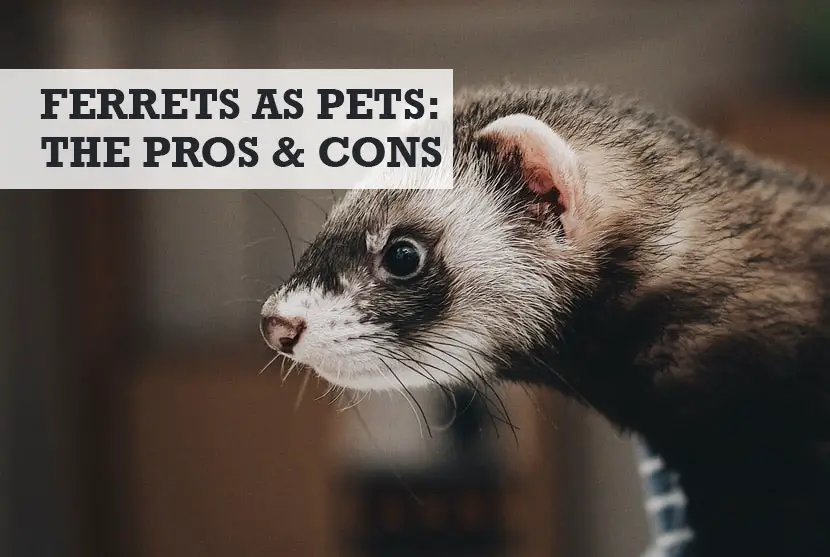Ferrets have great personalities but can remain a little bit wild, despite years of domestication. In my experience, owning a ferret is like having a soft, pliable cat or dog that never grows up.
They are overly reliant on their looks and character, however, because they are actually high maintenance pets. They are escape artists that need a specialised diet. They will steal your socks and stink up the house, if not managed correctly.
Based on this, you might ask whether ferrets are good pets for beginners. It’s a good point, but… if you can put the effort needed to ensure that you and your ferret can live together compatibly, you will be rewarded with many hours of affection and amusement.
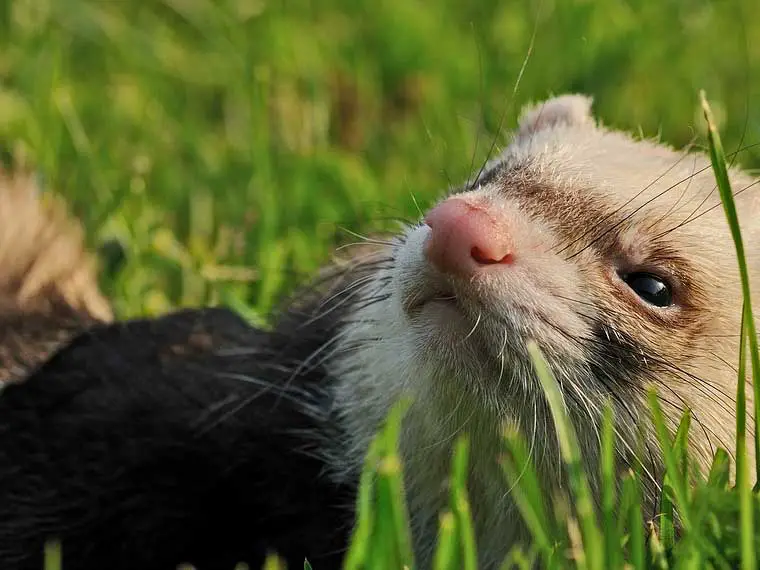
Do ferrets make good pets?
Here’s my view on why ferrets can make good pets, but also why ferrets are not good pets for some people with pros and cons listed.
Their behaviour
The good points
Ferrets are playful, almost comical, little creatures that will provide you with hours of entertainment, with their antics. This can make ferrets great pets if you want that level of fun… all the time!
They are intelligent and inquisitive. It is easy to amuse a ferret with a new toy or a change of environment.
Ferrets are sociable and affectionate, especially as they get older. They will play with you and even snuggle up next to you for a nap. If you want a loveable companion, ferrets make good pets and love to bond with their owners.
They sleep for 18 to 20 hours a day. Ferrets are crepuscular which means they are most active around dawn and at evening twilight. This will suit you if you work from 9 to 5, as the ferret will be awake to interact in the mornings and again, when you get home.
Ferrets have an interesting range of vocal interactions. These are all relatively quiet and will not disturb neighbours.
Ferrets are also a low cost pet. Here’s how much it costs to keep one. If you’re on a budget, a ferret can make a very good pet.
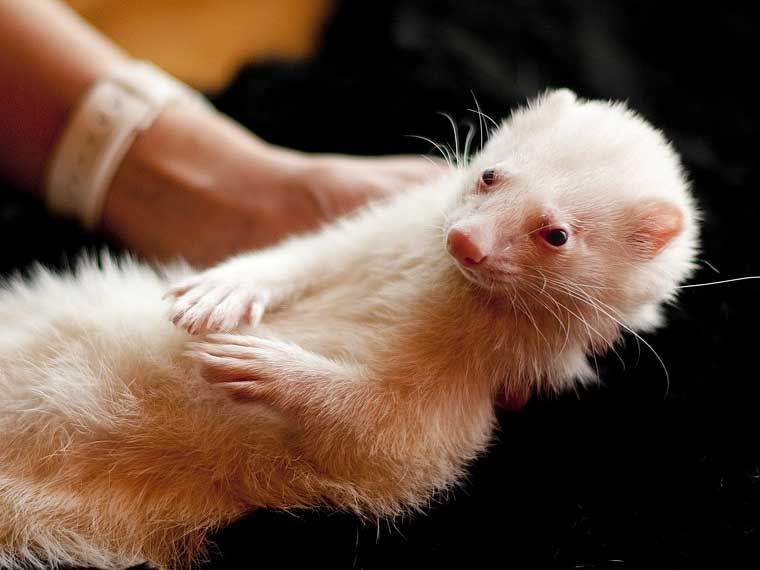
The not so good points
Ferrets are sociable animals and would prefer to be with their own kind. So to keep your ferret happy, it is best to have two, or preferably a small group, or ‘business’, of ferrets.
Like humans and many animal species, their temperaments vary. Some ferrets will be affectionate and extrovert, and others more aloof.
Ferrets do not always play nicely. It takes a while to understand their body language, something that young children and other pets do not always get right. Ferrets do not react well to being shouted at and do not like surprises. A misunderstood ferret could nip, or bite hard. Their teeth can crush bones so this will not be a pleasant experience.
Based on this, I don’t think ferrets make good pets for beginners if you have small children or other pets with a high prey drive like dogs.
They have thicker skins than most other domesticated animals and tend to punch above their weight. While they may play happily with a Jack Russell, who shares the same foolhardy sentiment, playing with a Rottweiler or Pit Bull might have a different outcome, regardless of the thickness of their skin.
Despite centuries of domestication, ferrets are still predatory. They have a keen sense of their standing in the food chain and will not cohabit easily with rodents, reptiles or birds.
Their intelligence, inquisitive natures know no bounds. Curiosity killed the cat, and no doubt a few ferrets. It has also left destruction in its wake. For example, they could bite cords and get entangled in slatted blinds.
Ferrets do not respect private property. Their motto is “what’s mine is mine, and what’s yours is also mine”. They have a reputation for being sneak thieves. Much like a magpie, if they find something that interests them, they will abscond with it.
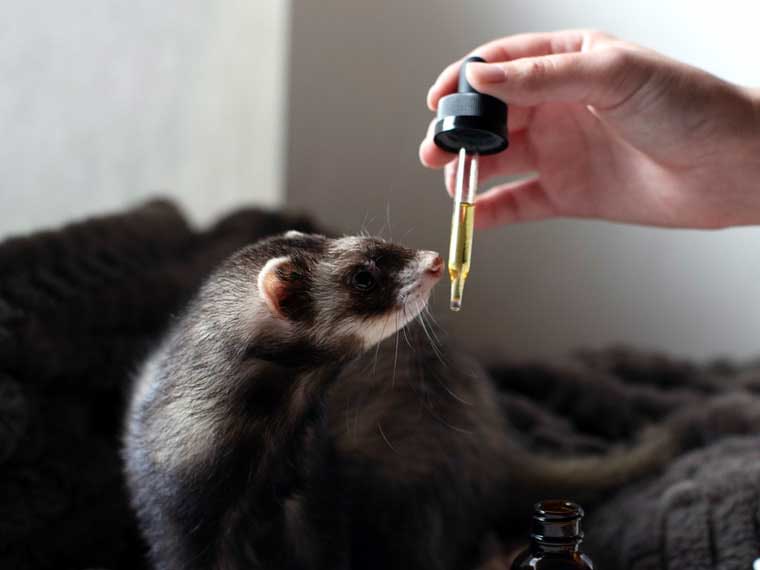
Ferrets are a flight risk. They actively look for opportunities to escape, regardless of how palatial their accommodation is. It must be the call of the wild. You will need to ensure that any areas accessible to your ferret are escape proof.
Their sleek, agile appearance belies their clumsiness. Out of curiosity, or in a bid to escape, they will get into places that are too high or too precarious for their physical capabilities. They have small, fragile bodies and could fall and injure themselves.
Their sleeping habits are not cast in stone. They may feel the urge to indulge in a spot of night time activity which could disturb your sleep patterns if they are housed close by.
If you want a good night’s sleep, ferrets are not good pets!
Physical
Their good points
Ferrets are sleek, soft and cuddly, when they are in the mood. They are exotic creatures with interesting movements and vocal cues.
They are small so do not take up much space and are easily transported.
Ferrets do not need structured exercise regimes, like a dog that needs a walk every evening.
So, if you’re a person who wants a pet that you don’t need to constantly exercise or don’t have much space in your home, a ferret can make a good pet
The not so good points
These small creatures can hide in places that are inaccessible to humans, and become a danger to themselves. They can get inside or behind your drawers, and may get into trouble if your recliner or sofa bed has mechanical innards. They can also curl up undetected in towels or clothing that is left on the floor, so tread warily.
Ferrets may not take up much space themselves but their paraphernalia does. They need a cage, preferably a multi-story one, and an enriched environment in which to play. This translates to an obstacle course of tunnels, boxes and other hiding places that takes up floor space.
They need to follow a carnivorous diet, either of specialised ferret kibble or raw meat. Too much starch in its diet will throw your ferret’s digestive system out of kilter. Over time, it could become obese and develop metabolic problems, such as insulin resistance or diabetes.
Ferrets also have the tendency to test small foreign objects by swallowing them. These can get stuck in their short digestive tracts, necessitating a trip to the vet, and possibly expensive surgery – if your ferret suddenly gets skinny, this could be the issue.
When they eliminate what they have eaten, they are none too tidy. They tend to back themselves into a corner, and spray up against the walls. A corner litter tray, with a skirting board covering, is advised.
You will need to place one of these in each area the ferret frequents. The litter trays will need to be cleaned frequently else the ferret will choose other spots for their ablutions.
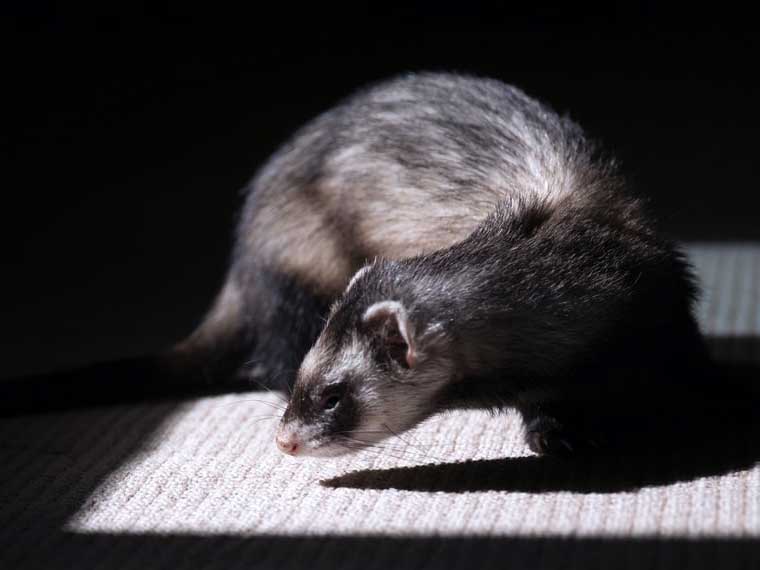
There are a number of odours associated with ferrets. The most obnoxious emanates from the anal gland. Thankfully, this is usually removed by the breeder, when the animal is very young.
They also have scent glands on their faces which they use to mark their territories. You may not be aware of the aroma after living with a ferret for a while, but your guests might make a comment or two.
Ferrets are related to skunks and polecats, neither of which are reputed to smell good. There is a musky smell that dedicated ferret owners seem to revel in. As in most other species, un-neutered males are the worst culprits (some owners will descent their ferret).
They can be bathed but this practice should not be done more than once or twice per month, else they lose their natural oils. If this happens, the glands will double down and excrete extra oils, negating the effects of the bath.
Their ears also emit a strange odour if they are not cleaned regularly. This is a delicate task and best left to someone who knows how to do it, for example, your vet.
These odours may cling to your soft furnishings and create a less than welcoming environment for inhabitants and guests. Organic deodorisers are advised.
Ferrets do not enjoy warm temperatures so need a controlled environment in which to sleep and play. This may be a tad cooler than is comfortable for the humans in the household. In summer you will need to dedicate the coolest place in the house to their sleeping quarters.
In most states in the United States, breeders cannot sell ferrets unless they are neutered. This means that they are desexed at a very young age, which often causes hormonal problems later.
On the flip side, if they are not neutered and are not give an opportunity to mate, they develop a different set of hormonal issues.
It is advisable to find a vet that understands ferret health. These were once few and far between but with the growing popularity of ferrets as pets, happily this situation is changing.
Conclusion
To conclude, I love ferrets and think they can make good pets for beginners and all sorts of people. However, as with any animal, you get what you put in. If you are prepared to put time into your ferret, keep them safe and healthy, and don’t neglect them, a ferret is an amazing pet.
If you want to know how you can make a ferret a good pet, you might enjoy some of the other ferret guides on the website.
You might also like…
- The correct temperature to keep your ferrets comfortable
- How to keep ferrets cool in hot summers
- The truth about ferrets and their relationship with rats
Image in header via https://unsplash.com/photos/FnpFMheGjH0

